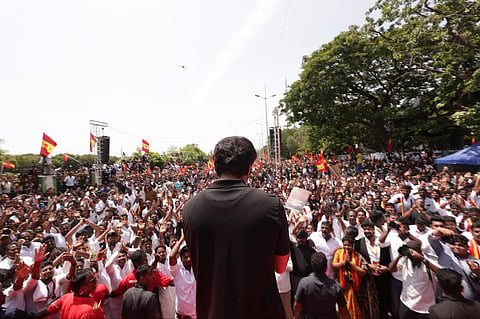
Chennai- Thirty-one names. Thirty-one families shattered. Thirty-one lives cut short in police custody since May 2021 (Evidence and People's watch). Behind each statistic lies a human story – a son who will never return home, a father whose children will grow up without him, a young man whose dreams died in a police station cell.
From Coimbatore to Chennai, from Namakkal to Sivagangai, the geography of grief spans across Tamil Nadu. The victims range from 17-year-old Gokul Sri, who died in a juvenile home in Changalpettu, to 60-year-old Jeyakumar, who never made it out of judicial custody from Palayamkottai Central Prison . Their only common thread: they all died while in the custody of the state that was meant to protect them.
Since the DMK government took office, at least 31 custodial deaths have been reported in Tamil Nadu, many linked to allegations of police torture.
As per The News Minute report, since 2022, 24 custodial deaths have occurred as a direct result of police torture, including that of a 17-year-old in the Chengalpattu juvenile home who endured unimaginable abuse, leaving him with 96 injury marks.
In 2024, more than 300 accused persons entered Puzhal Prison, Chennai, with broken limbs, according to RTI data. The police offered the feeble excuse of “slippery toilets” for these injuries. The Madras High Court slammed the police, asking why no police officer had slipped in these toilets.
Custodial deaths, particularly those involving torture, represent a grave violation of human rights, contravening India’s obligations under international frameworks like the UN Convention Against Torture, which the country has yet to ratify. The absence of a specific anti-torture law and the reliance on police self-investigation perpetuate a cycle of impunity. The Coalition of People’s Movements Against Police Violence has urged the Tamil Nadu Assembly to enact legislation criminalizing custodial torture and to install functional CCTV cameras in police stations for transparency.
Dalit rights activist Shalin Maria Lawrence, who has been tracking custodial violence patterns, highlights a disturbing trend: " The official figure is 31 in 4 years, just imagine! Most of these cases involve Dalits and people from marginalized communities who are easily prey to repression and atrocities. Without proof and evidence, they are taken into custody on petty thefts and who is there to speak for them? The system preys on the voiceless."
The morning of July 13, saw something unprecedented in Chennai. Over 12,000 people gathered, their voices rising in unison: "Sorry Vendam, Needhi Vendum" – We want justice, not sorry. Leading them was actor-turned-politician Vijay founder of Tamilaga Vettri Kazhagam (TVK) holding a placard that captured the collective anger of thousands.
Vijay criticized the DMK for its “publicity-model-turned-sorry-model” governance and demanded justice and compensation for the families of all torture-linked custodial death victims since 2021. He also called for a court-monitored Special Investigation Team (SIT) probe, accusing the DMK of hiding behind the CBI.
"How many more families must lose their sons before we say enough?" shouted homemakers from various parts of the city who joined the protest. Their voice cracked as they raised slogans because they were mothers who lived under constant fear whenever their sons were late to reach home.
The crowd represents a cross-section of Tamil society – students bunking tution classes, auto drivers who parked their vehicles to march, factory workers who took the day off. They carry photos of the victims, transforming statistics into faces, numbers into names.
Ajith Kumar, a security staff member at the Madapuram Bhathrakali Amman temple, was picked up for inquiry on June 27 in connection with the theft of 9.5 sovereigns of gold. Initially questioned by the Tiruppuvanam police, he was later allegedly detained by a six-member special team, which brutally assaulted him. He reportedly collapsed and died en route to the hospital. The incident has sparked widespread criticism of police high-handedness.
Chief Minister Stalin, who also holds the Home portfolio, personally called Ajith Kumar’s mother and issued a public apology to her.
Social media has amplified the movement beyond physical protests. Hashtags like #JusticeForAjithKumar and #StopCustodialDeaths trend regularly, with users sharing personal stories and demanding accountability.
The Ajith Kumar case and the broader issue of custodial deaths have sparked significant reactions on social media, reflecting public anger and demands for reform.
Speaking on the protests, DMK spokesperson Saravanan Annadurai told ANI, "Mr. Vijay is trying to appear active in Tamil Nadu politics but is often criticised for only tweeting from his bungalow. To counter that image, he staged a protest over a custodial death. Yes, the incident was tragic, but the government acted swiftly, arrests were made, compensation given, and the case handed to the CBI... Claims of 20 custodial murders are misleading; only 4 were confirmed cases, others were natural deaths. If Vijay wants a court-monitored probe, he should approach the court. The system is working, and due process is being followed... DMK has consistently stood up to the BJP, more than any other party... What has Mr. Vijay done besides issue statements on Twitter?
As protests continue and families wait for justice, the broader question remains: Can Tamil Nadu break the cycle of custodial violence? The answer lies not just in individual prosecutions, but in systemic reform.
You can also join our WhatsApp group to get premium and selected news of The Mooknayak on WhatsApp. Click here to join the WhatsApp group.